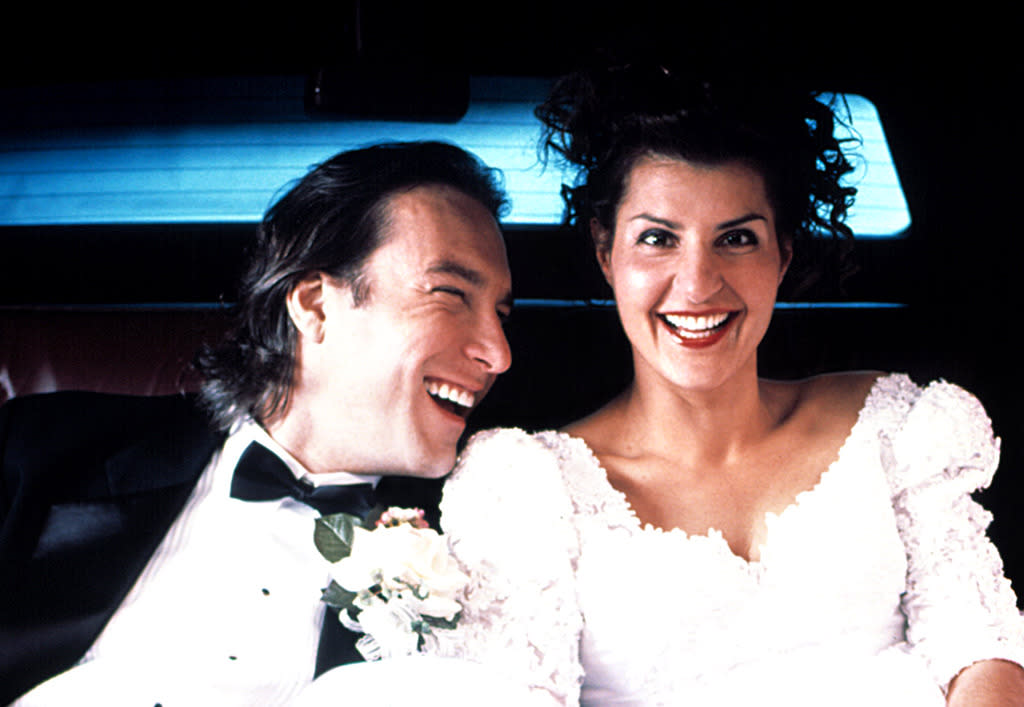How 'My Big Fat Greek Wedding' Went From Indie Darling to Blockbuster Hit

John Corbett and Nia Vardalos in ‘My Big Fat Greek Wedding’ (Everett)
My Big Fat Greek Wedding 2 is arriving in theaters this weekend, 14 years after My Big Fat Greek Wedding became the surprise hit of 2002. Given the decade-plus that has passed, some may have forgotten what an unusual phenomenon the first movie was, growing from a small, limited-release indie starring an actress no one had heard of into the fifth highest-grossing movie of the year and the top grossing romantic comedy of all time. For those planning to reconnect this weekend with Toula, her bonkers family, and her father’s ever-ready bottle of Windex, here’s a timeline that touches on the milestones from the year that Nia Vardalos ruled the box office.
Related: ‘My Big Fat Greek Wedding 2’ Star Nia Vardalos Reveals the Inspiration for Her New Film
April 19, 2002: My Big Fat Greek Wedding is released in nine cities, according to the L.A. Times, allowing Vardalos’s one-woman stage show to become a movie with the clout of producers Rita Wilson and Tom Hanks behind it. Initial reviews are mixed but leaning toward the positive. Roger Ebert praises it for being “warm-hearted in the way a movie can be when it knows its people inside out,” while the New York Times’s Dave Kehr writes that Vardalos “has clearly performed this material enough to know exactly where the laughs are, and she gets them, often in spite of the pedestrian direction.” Owen Gleiberman of Entertainment Weekly gives the movie a D and says it “turns the very concept of ‘Greek’ into the sort of hideous, pandering clichés that look rejected from bad Jewish and Italian sitcoms.” As a collective whole, these assessments do not necessarily signal that this film is about to sweep the nation.
May 19, 2002: The nation-sweeping very slowly begins as My Big Fat Greek Wedding, by this time screening in an increased but still modest 275 theaters, cracks the top 10 for the first time, the same week that a little movie called Star Wars: Episode II — Attack of the Clones opens at No. 1. Vardalos’s little film has made $5.6 million at this point, a bit more than the $5 million it cost to make.
Watch the original trailer:
August 2002: My Big Fat Greek Wedding cements its status as the sleeper hit of the summer, officially going into wider release at the beginning of the month with more than $40 million in its wallet and a ton of press coverage shouting “Opa!” about its success. Pieces in Variety and various major newspapers, including The Washington Post, USA Today and the New York Times, anoint it as the motion-picture Cinderella story of the year. More specifically, the Los Angeles Times explains how a word-of-mouth-focused marketing strategy that zeroed in initially on the Greek community, then expanded outward, helped give the film such incredibly sturdy legs. The same piece also notes that the movie’s old-fashioned, non-effects-driven qualities may be especially appealing to audiences who are growing fatigued with tent pole releases, although Marc Shmuger, then vice-chairman of Universal, adds, “When the audience displays less keen interest in the franchises, then we certainly won’t be doing it in this industry.”
Sept. 2, 2002: The movie ends the Labor Day weekend in second place at the box office, its highest ranking to date and, it would turn out, ever. (Despite all its success, MBFGW never does become the No. 1 movie in the country.) At this point, it’s made $82.5 million; a couple of weeks later, it will crack the $100 million mark. This is all happening more than four months after the rom-com’s initial release, at a moment when most of the summer’s mega-movies — Spider-Man, Attack of the Clones, Men in Black II, Minority Report — are either gone or fading quickly from theaters. For a film to stick around so strongly for so long was extremely rare then, and remains just as rare now.

‘My Big Fat Greek Wedding’ (Everett)
Sept. 18, 2002: Variety reports that CBS has picked up a TV version of My Big Fat Greek Wedding, to be named My Big Fat Greek Life, as a midseason replacement. The series, which would air in the spring of 2003, would not enjoy the same success as the movie. CBS would swiftly cancel it and only seven episodes — all starring Vardalos and Stephen Eckhardt in the role once occupied by John Corbett — would make it to air.
Oct. 7, 2002: With $142 million to its credit, My Big Fat Greek Wedding is anointed the “highest-grossing independent film ever” by the L.A. Times, besting The Blair Witch Project. Wedding wouldn’t hold the title long; a couple of years later, The Passion of the Christ would claim it.

Nia Vardalos at the 2003 Academy Awards (Photo by Steve Granitz/WireImage)
Nov. 24, 2002: Spray Windex on this movie all you want, it’s still not going away. It’s the weekend before Thanksgiving, and My Big Fat Greek Wedding remains in the box-office top 10, where its grand total just cracked the $200 million mark.
Feb. 11, 2003: The Academy Award nominations are announced and My Big Fat Greek Wedding picks up one, for best original screenplay. It would eventually lose the Oscar to Pedro Almodovar’s Talk to Her.
April 2003: Having earned $241.4 million in North America and $127.3 million overseas, My Big Fat Greek Wedding finally leaves U.S. theaters a full year after its debut, and 13 years before its sequel will attempt to replicate its unprecedented success.

